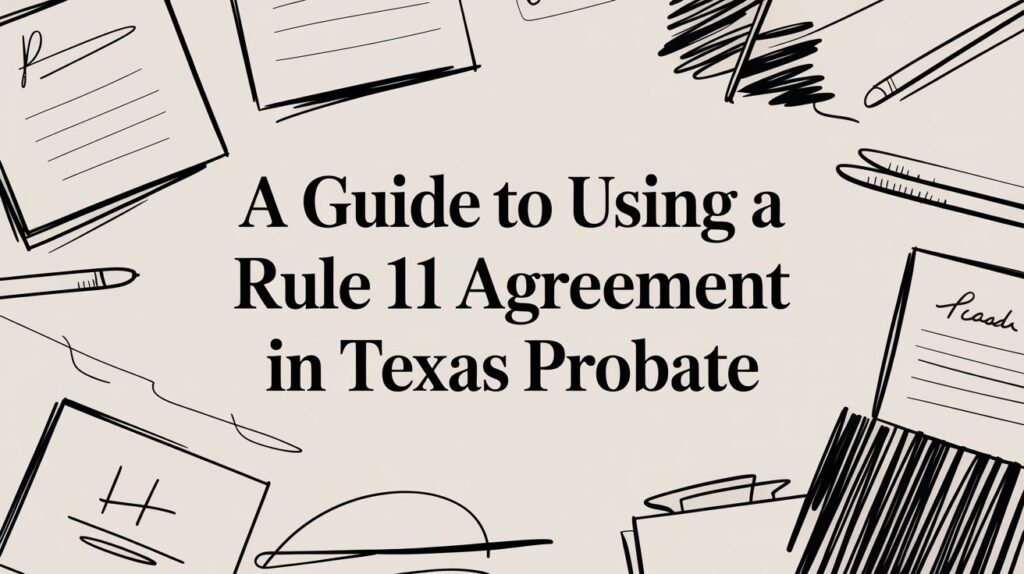When families talk about inheritances, the conversation often feels more personal than legal. Parents may tell their children, “One day, the house will be yours,” or “You’ll get my land when I’m gone.” These verbal promises carry emotional weight and are often taken at face value. But when it comes to Texas estate law, spoken assurances mean little without the proper legal foundation. An estate can quickly spiral into disputes if a parent, grandparent, or relative makes informal promises about property without ensuring those promises comply with Texas law.
This raises a critical question: Are verbal promises about inheritance enforceable in Texas? The short answer is no, not without a written and legally valid document. For families, this can create a dangerous limbo where property ownership is unclear, heirs feel misled, and courts are left untangling disputes that could have been avoided.
Why Texas Courts Require More Than Words

Texas law places property transfers and estate matters under the Statute of Frauds. This legal principle requires certain types of agreements, including the transfer of real property, to be in writing and signed by the party responsible for the transfer. That means if a parent promises their child a ranch, farmland, or even a family home without putting it in a will or deed, the courts will not recognize that transfer.
From a legal perspective, words are not enough to secure title to real property. Ownership in Texas depends on formal documents such as deeds, wills, or trusts. Without them, the person who made the promise could change their mind, creditors could interfere, or other heirs could step in with competing claims. What felt like a guaranteed inheritance can disappear overnight.
Courts emphasize certainty. The law is structured to prevent fraud, manipulation, or misunderstandings about property rights. A verbal statement might be sincere at the time it is made, but without a written instrument, it has no enforceable power once the person making the promise passes away or becomes incapacitated.
When Verbal Promises Cause Estate Disputes
Family conflicts over estates often trace back to verbal promises. A parent may have told one child they would inherit the family home, while another sibling believes all property should be divided equally. Without a written will, each child’s interpretation of the promise can be different. Texas intestacy laws, which control how property is distributed when there is no will, will apply regardless of what the parent said during their lifetime.
These situations commonly create disputes in probate court. For example, a child who was verbally promised property may attempt to argue that the parent’s intent should control distribution. But judges are bound by the law, not oral statements. Unless there is written proof of the transfer—such as a signed deed or will—the verbal assurance carries no legal effect.
The fallout from these disputes can be devastating. Families that once had close relationships can fracture under the strain of litigation. Legal costs can quickly consume estate assets, leaving little behind for heirs. Even worse, the property may remain tied up in litigation for years, delaying its use or transfer to anyone.

Limited Exceptions and Equitable Doctrines
While Texas generally rejects verbal promises in estate matters, there are narrow exceptions where courts may intervene. In rare circumstances, doctrines such as promissory estoppel or constructive trust can apply. These legal tools allow courts to enforce a promise when not doing so would result in clear injustice.
For instance, if one child relied on a verbal promise to their detriment, such as spending years maintaining property or paying taxes with the understanding they would inherit it, a court might impose a constructive trust. This equitable remedy does not recognize ownership directly from the verbal promise but instead prevents unjust enrichment by ensuring the property is held for the benefit of the person who relied on the promise.
However, these exceptions are extremely limited and fact-specific. They require significant evidence, and the burden of proof is high. A vague statement like “the house will be yours one day” is unlikely to convince a judge. Families relying on these doctrines face long, uncertain legal battles, which could have been avoided with proper estate planning.
The Role of Wills and Deeds in Avoiding Limbo
The safest way to prevent property from being left in limbo is through formal documentation. In Texas, real property transfers must occur either during life through a deed or at death through a valid will or trust. A will ensures that the decedent’s wishes are carried out under probate court supervision. A deed, signed and recorded, transfers ownership while the grantor is still alive.
Even small mistakes in documentation can undermine these protections. A will that is improperly executed or lacks required signatures can be contested. A deed that is never recorded may not provide the legal protection heirs expect. This is why working with an experienced estate planning attorney is so critical. They ensure every transfer complies with Texas law and leaves no room for misinterpretation.

How Intestacy Law Overrides Promises
If someone dies without a valid will in Texas, the state’s intestacy laws take over. These laws provide a rigid formula for distributing property among surviving spouses, children, and other relatives. Importantly, intestacy laws do not account for promises, relationships, or personal circumstances.
For example, if a father promises his daughter that she will inherit the family home but never puts that promise in writing, and then dies without a will, the home does not automatically go to the daughter. Instead, intestacy law may divide the property between all children, or between the surviving spouse and children, depending on the family structure. The daughter’s expectations, even if based on years of assurances, carry no legal weight.
This reality highlights why verbal promises create false security. Heirs may believe their inheritance is safe, only to learn the law dictates otherwise. The gap between expectation and legal reality fuels bitter disputes.
Protecting Families From Verbal Estate Pitfalls
Families in Texas can take proactive steps to avoid the risks of verbal promises. Open conversations about estate planning should be paired with immediate legal action. If a parent intends to leave property to a specific child, that intention must be documented through a will, deed, or trust. Estate planning attorneys can help families draft these documents in compliance with Texas law, ensuring enforceability.
In addition, families should recognize that estate planning is not a one-time task. Life events such as marriages, divorces, births, and deaths require updates to existing documents. An outdated will can create as much confusion as no will at all. Regular reviews ensure that promises and intentions remain legally protected.
Why Clarity Matters More Than Promises
At its core, the problem with verbal promises in estate transfers is the lack of clarity. Family members may remember promises differently. A parent may make multiple assurances to different people at different times. Without a written document, there is no definitive record of intent.
Clarity prevents conflict. It protects not only heirs but also the legacy of the person making the promise. No one wants their family embroiled in litigation after their death. By putting intentions into writing, individuals honor both their wishes and their family’s peace of mind.
Conclusion
Verbal promises about property in Texas may feel meaningful, but they do not carry legal authority. Under the Statute of Frauds and Texas probate law, property transfers require formal documentation to be enforceable. While limited exceptions exist, they are difficult to prove and often lead to long, costly litigation.
For families, the risks of leaving property in limbo are significant. Disputes can divide siblings, drain estate assets, and leave property tied up in court for years. The only way to avoid these outcomes is through clear, legally valid estate planning. A promise is not enough. In Texas, only a written will, deed, or trust ensures property transfers according to intention rather than default law. Families who take the step of formalizing these transfers protect both their loved ones and their legacy.








